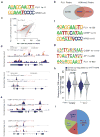Mutant Huntingtin promotes autonomous microglia activation via myeloid lineage-determining factors
- PMID: 24584051
- PMCID: PMC4113004
- DOI: 10.1038/nn.3668
Mutant Huntingtin promotes autonomous microglia activation via myeloid lineage-determining factors
Abstract
Huntington's disease (HD) is a fatal neurodegenerative disorder caused by an extended polyglutamine repeat in the N terminus of the Huntingtin protein (HTT). Reactive microglia and elevated cytokine levels are observed in the brains of HD patients, but the extent to which neuroinflammation results from extrinsic or cell-autonomous mechanisms in microglia is unknown. Using genome-wide approaches, we found that expression of mutant Huntingtin (mHTT) in microglia promoted cell-autonomous pro-inflammatory transcriptional activation by increasing the expression and transcriptional activities of the myeloid lineage-determining factors PU.1 and C/EBPs. We observed elevated levels of PU.1 and its target genes in the brains of mouse models and individuals with HD. Moreover, mHTT-expressing microglia exhibited an increased capacity to induce neuronal death ex vivo and in vivo in the presence of sterile inflammation. These findings suggest a cell-autonomous basis for enhanced microglia reactivity that may influence non-cell-autonomous HD pathogenesis.
Conflict of interest statement
COMPETING FINANCIAL INTERESTS:
The authors declare no competing financial interests.
Figures







References
-
- Streit WJ, Walter SA, Pennell NA. Reactive microgliosis. Prog Neurobiol. 1999;57:563–581. - PubMed
-
- Samii A, Nutt JG, Ransom BR. Parkinson’s disease. Lancet. 2004;363:1783–1793. - PubMed
-
- HDRCG A novel gene containing a trinucleotide repeat that is expanded and unstable on Huntington’s disease chromosomes. Cell. 1993;72:971–983. - PubMed
Publication types
MeSH terms
Substances
Associated data
- Actions
Grants and funding
LinkOut - more resources
Full Text Sources
Other Literature Sources
Medical
Molecular Biology Databases

